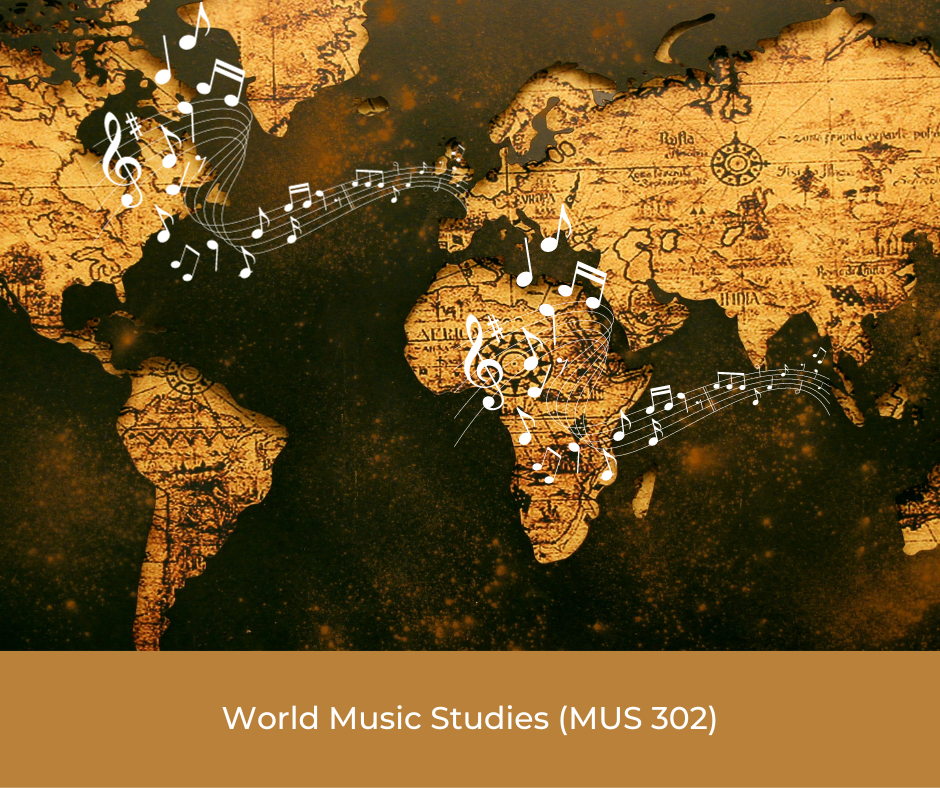Course Description – World Music Studies (MUS 302):
MUS 302 offers an immersive exploration of music from diverse cultures across the globe. This course provides students with a profound appreciation for the rich tapestry of global musical traditions, allowing them to delve into the cultural significance and unique instruments associated with each tradition.
Outline of Major Content Areas:
- Introduction to World Music:
- Overview of the course and the importance of studying world music.
- Exploring the interconnectedness of music, culture, and society.
- African Music Traditions:
- In-depth examination of various African musical styles and instruments.
- Exploration of the historical and cultural contexts of African music.
- Asian Music Traditions:
- Study of diverse Asian musical traditions, including Indian classical music, Chinese opera, and Japanese Taiko drumming.
- Analysis of the cultural and spiritual aspects of Asian music.
- Latin American and Caribbean Music:
- Exploration of Latin American rhythms, such as salsa, samba, and reggaeton.
- Understanding the cultural fusion and influences in Latin American and Caribbean music.
- Middle Eastern and Mediterranean Music:
- Study of music from the Middle East and Mediterranean regions, including Arabic maqam and Greek rebetiko.
- Examination of the role of music in Middle Eastern and Mediterranean cultures.
- Indigenous and Folk Music:
- Exploration of indigenous and folk music traditions from around the world.
- Understanding the preservation and adaptation of these traditions.
- Contemporary Global Fusion:
- Analysis of contemporary global fusion music and its role in the modern world.
- Discussion of artists who blend diverse musical elements.
- Musical Instruments of the World:
- Introduction to unique musical instruments from various cultures.
- Hands-on experience and exploration of instrument-making traditions.
Course Learning Outcomes:
Upon successful completion of MUS 302, students will be able to:
- Demonstrate a comprehensive understanding of diverse global music traditions, including their cultural significance and historical contexts.
- Identify and appreciate various musical styles and instruments from different regions, fostering a cross-cultural appreciation of music.
- Analyze the impact of social, historical, and geographical factors on the development of world music traditions.
- Engage in critical discussions about the fusion of global music styles in contemporary contexts.
- Recognize the importance of preserving and respecting indigenous and folk music traditions.
Methods for Assessing Student Learning:
Assessment in this course will employ multiple methods to evaluate students’ comprehension of world music traditions and their cultural significance:
- Listening and Analysis: Students will analyze and critique musical pieces from various cultures, demonstrating their understanding of musical styles and traditions.
- Research Projects: Investigating and presenting on specific world music traditions, including cultural contexts and instruments.
- Class Participation: Engaging in discussions, activities, and hands-on instrument exploration related to world music.
- Listening Journals: Reflecting on personal responses to select musical pieces and cultural insights gained during the course.
- Final Project: Creating a presentation or performance that showcases knowledge and appreciation of a particular world music tradition.
These assessments will enable students to develop a profound appreciation for the global diversity of music, fostering cultural sensitivity and cross-cultural understanding through the universal language of music.
